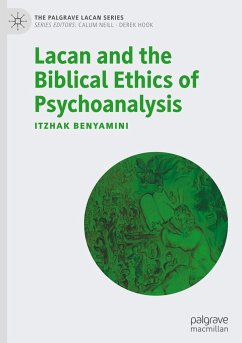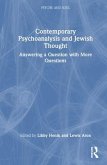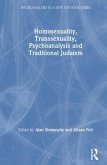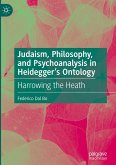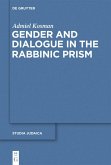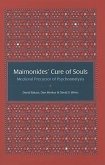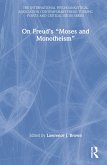Itzhak Benyamini
Lacan and the Biblical Ethics of Psychoanalysis
Itzhak Benyamini
Lacan and the Biblical Ethics of Psychoanalysis
- Gebundenes Buch
- Merkliste
- Auf die Merkliste
- Bewerten Bewerten
- Teilen
- Produkt teilen
- Produkterinnerung
- Produkterinnerung
In this fascinating and ground-breaking book, Itzhak Benyamini uses discourse analysis to lay out the way Lacan constructed his own intellectual discourse informed by Judeo-Christianity. Offering an understanding of Lacan's emergence and intellectual struggles with significant contemporary intellectuals, the author builds a panoramic view of the entire psychoanalytic discourse at the time of the foundational post-Freudian generation. By engaging in close reading of texts and seminars given by Lacan between the 1930s and 50s, Benyamini uncovers the coming-into-being of Lacan's key concepts: The…mehr
Andere Kunden interessierten sich auch für
![Contemporary Psychoanalysis and Jewish Thought Contemporary Psychoanalysis and Jewish Thought]() Contemporary Psychoanalysis and Jewish Thought149,99 €
Contemporary Psychoanalysis and Jewish Thought149,99 €![Homosexuality, Transsexuality, Psychoanalysis and Traditional Judaism Homosexuality, Transsexuality, Psychoanalysis and Traditional Judaism]() Homosexuality, Transsexuality, Psychoanalysis and Traditional Judaism159,99 €
Homosexuality, Transsexuality, Psychoanalysis and Traditional Judaism159,99 €![Judaism, Philosophy, and Psychoanalysis in Heidegger¿s Ontology Judaism, Philosophy, and Psychoanalysis in Heidegger¿s Ontology]() Federico Dal BoJudaism, Philosophy, and Psychoanalysis in Heidegger¿s Ontology95,99 €
Federico Dal BoJudaism, Philosophy, and Psychoanalysis in Heidegger¿s Ontology95,99 €![The Femininity Puzzle The Femininity Puzzle]() Ulrike BrunotteThe Femininity Puzzle45,00 €
Ulrike BrunotteThe Femininity Puzzle45,00 €![Gender and Dialogue in the Rabbinic Prism Gender and Dialogue in the Rabbinic Prism]() Admiel KosmanGender and Dialogue in the Rabbinic Prism88,99 €
Admiel KosmanGender and Dialogue in the Rabbinic Prism88,99 €![Maimonides' Cure of Souls: Medieval Precursor of Psychoanalysis Maimonides' Cure of Souls: Medieval Precursor of Psychoanalysis]() David BakanMaimonides' Cure of Souls: Medieval Precursor of Psychoanalysis101,99 €
David BakanMaimonides' Cure of Souls: Medieval Precursor of Psychoanalysis101,99 €![On Freud's "e;Moses and Monotheism"e; On Freud's "e;Moses and Monotheism"e;]() On Freud's "e;Moses and Monotheism"e;169,99 €
On Freud's "e;Moses and Monotheism"e;169,99 €-
-
-
In this fascinating and ground-breaking book, Itzhak Benyamini uses discourse analysis to lay out the way Lacan constructed his own intellectual discourse informed by Judeo-Christianity. Offering an understanding of Lacan's emergence and intellectual struggles with significant contemporary intellectuals, the author builds a panoramic view of the entire psychoanalytic discourse at the time of the foundational post-Freudian generation.
By engaging in close reading of texts and seminars given by Lacan between the 1930s and 50s, Benyamini uncovers the coming-into-being of Lacan's key concepts: The Mirror Stage, the Imaginary, the Real, the Symbolic, the Name-of-the-Father, the Other, jouissance, and das Ding. The author argues that Lacan wished to regulate this process of conceptualization by connecting the concepts of the "Father" and the "Other" with themes from the Judeo-Christian tradition, especially the Biblical one, to create a clinical ethic, that does not reflect aworldview or ideology and is guided solely by the analyzand's unconscious desire.
By engaging in close reading of texts and seminars given by Lacan between the 1930s and 50s, Benyamini uncovers the coming-into-being of Lacan's key concepts: The Mirror Stage, the Imaginary, the Real, the Symbolic, the Name-of-the-Father, the Other, jouissance, and das Ding. The author argues that Lacan wished to regulate this process of conceptualization by connecting the concepts of the "Father" and the "Other" with themes from the Judeo-Christian tradition, especially the Biblical one, to create a clinical ethic, that does not reflect aworldview or ideology and is guided solely by the analyzand's unconscious desire.
Produktdetails
- Produktdetails
- The Palgrave Lacan Series
- Verlag: Palgrave Macmillan / Resling / Springer Nature Switzerland / Springer, Berlin
- Artikelnr. des Verlages: 978-3-031-39968-8
- 1st ed. 2023
- Seitenzahl: 308
- Erscheinungstermin: 9. Dezember 2023
- Englisch
- Abmessung: 216mm x 153mm x 22mm
- Gewicht: 513g
- ISBN-13: 9783031399688
- ISBN-10: 3031399684
- Artikelnr.: 68342137
- The Palgrave Lacan Series
- Verlag: Palgrave Macmillan / Resling / Springer Nature Switzerland / Springer, Berlin
- Artikelnr. des Verlages: 978-3-031-39968-8
- 1st ed. 2023
- Seitenzahl: 308
- Erscheinungstermin: 9. Dezember 2023
- Englisch
- Abmessung: 216mm x 153mm x 22mm
- Gewicht: 513g
- ISBN-13: 9783031399688
- ISBN-10: 3031399684
- Artikelnr.: 68342137
Itzhak Benyamini teaches at the Tel Aviv University and Bezalel Jerusalem, Israel. He is the editor of Resling publishing house and the author of a number of books, including Narcissist Universalism (Bloomsbury, 2012) and A Critical Theology of Genesis (Palgrave, 2016).
1 Introduction: Life and Celestial Jerusalem.- 2 The Clinical Experience and the Birth of the Symbolic Order: Lacan's Theoretical Leap in 1953.- 2.1 "The Neurotic's Individual Myth".- 2.2 "The Function and Field of Speech and Language in Psychoanalysis".- 3 "Family Complexes" (1938): An Early Model of the Return to Freud and the Conceptualization of the Father.- 3.1 The Splits of the Father in Freud's Theory: Between the Biological-Concrete and the Biological-Conceptual.- 3.2 Lacan's Criticism: The Family as a Sociocultural Institute.- 3.3 Splitting-and Saving-the-Father.- 3.4 The Father's Fall from Grace: The Invention of Psychoanalysis and Totalitarianism.- 3.5 Extracting the Jewish and Paternal in Bergson.- 3.6 Judaism and the Good Father.- 4 Return to the Logos: Between Dualism and Extimacy.- 4.1 The Logos: From Heraclitus to John.- 4.2 Logos in Christianity, Heidegger and Lacan.- 4.3 The Subject's Extimacy and the Other.- 4.4 In the Beginning Was the Word.- 4.5 The Body-SignifierDualism.- 4.6 The Logos and... Collective Dualism.- 4.7 Demythologization and the Logos.- 5 Lacan and Jung (1): The Threatening Affinity.- 5.1 The Slippery Slope to Occultism.- 5.2 Jung and Freud.- 5.3 Weltanschauung and Anti-ideology.- 5.4 The Non-libidinal Libido.- 5.5 The Imagined Similarity Between Lacan and Jung.- 5.6 Abstraction and Obscurity.- 5.6.1 Lacan and Jung's common denominator.- 5.6.2 Freud's Rejection of Jung's Style.- 6 Lacan and Jung (2): The Difference Between them and the Judeo-Christian Tradition.- 6.1 Lacan's Struggle Against Jungianism and the Difference Between the Imaginary and the Symbolic.- 6.2 Jung's Psychotic Imagination and Freud's Materialism.- 6.3 Anti-Jungianism and Anti-Gnosticism: Split in the Face of Harmony.- 7 Lévi-Strauss and Lacan following 'Totem and Taboo': What Is a Collective Unconscious?.- 7.1 The Anxiety of Metaphysics.- 7.2 The Jealous Father of 'Totem and Taboo'.- 7.3 The Processing of the Theory of Lévi-Strauss in the Lacanian Discourse.-7.4 Lacan Following Lévi-Strauss: The Mechanism of Language and the Metaphysical Danger.- 7.5 Lévi-Strauss and Lacan Rereading 'Totem and Taboo'.- 7.6 Jung, Freud, Lamarckism.- 7.7 Lacan's Processing of Freud's Lamarckism.- 8 "I am who I am" ("Eheye asher Eheye"): The Name-of-the-Father, the Other, and the Biblical Position.- 8.1 The Name-of-the-Father and Psychosis.- 8.2 Science and Psychoanalysis following the Cogito.- 8.3 Lacan's Seminar III: The God of Schreber.- 8.4 Seminar III: The Constitution of Modern Science and the Judeo-Christian Tradition.- 8.5 'I am who I am'.- 8.6 'I am who I am' in Seminar III.- 8.7 Following Racine and Jansenism.- 8.8 God of Speech and Desire.- 8.9 The Anti-Metaphysical Traditions of Judaism, Christianity and Lacanianism.- 9 The Ethics of Psychoanalysis, Judaism, and Christianity: Reading Seminar VII.- 9.1 Beyond the Pleasure Principle and Biology.- 9.2 The Real, Jouissance, and the Thing.- 9.3 The Theological Origins of Lacanian Ethics.- 9.4 The Law and the Thing in the Bible and in Paul.- 9.5 "Thou Shalt Love Thy Neighbor as Thyself " and Freud's Theory of Narcissism.- 9.6 The Law of Love and the Death of the God-Father in Paul and Lacan.- 9.7 The Two Faces of Freud's Moses.- 10 The Pleasures of Baroque: An Epilogue on Late Lacan.
1 Introduction: Life and Celestial Jerusalem.- 2 The Clinical Experience and the Birth of the Symbolic Order: Lacan's Theoretical Leap in 1953.- 2.1 "The Neurotic's Individual Myth".- 2.2 "The Function and Field of Speech and Language in Psychoanalysis".- 3 "Family Complexes" (1938): An Early Model of the Return to Freud and the Conceptualization of the Father.- 3.1 The Splits of the Father in Freud's Theory: Between the Biological-Concrete and the Biological-Conceptual.- 3.2 Lacan's Criticism: The Family as a Sociocultural Institute.- 3.3 Splitting-and Saving-the-Father.- 3.4 The Father's Fall from Grace: The Invention of Psychoanalysis and Totalitarianism.- 3.5 Extracting the Jewish and Paternal in Bergson.- 3.6 Judaism and the Good Father.- 4 Return to the Logos: Between Dualism and Extimacy.- 4.1 The Logos: From Heraclitus to John.- 4.2 Logos in Christianity, Heidegger and Lacan.- 4.3 The Subject's Extimacy and the Other.- 4.4 In the Beginning Was the Word.- 4.5 The Body-SignifierDualism.- 4.6 The Logos and... Collective Dualism.- 4.7 Demythologization and the Logos.- 5 Lacan and Jung (1): The Threatening Affinity.- 5.1 The Slippery Slope to Occultism.- 5.2 Jung and Freud.- 5.3 Weltanschauung and Anti-ideology.- 5.4 The Non-libidinal Libido.- 5.5 The Imagined Similarity Between Lacan and Jung.- 5.6 Abstraction and Obscurity.- 5.6.1 Lacan and Jung's common denominator.- 5.6.2 Freud's Rejection of Jung's Style.- 6 Lacan and Jung (2): The Difference Between them and the Judeo-Christian Tradition.- 6.1 Lacan's Struggle Against Jungianism and the Difference Between the Imaginary and the Symbolic.- 6.2 Jung's Psychotic Imagination and Freud's Materialism.- 6.3 Anti-Jungianism and Anti-Gnosticism: Split in the Face of Harmony.- 7 Lévi-Strauss and Lacan following 'Totem and Taboo': What Is a Collective Unconscious?.- 7.1 The Anxiety of Metaphysics.- 7.2 The Jealous Father of 'Totem and Taboo'.- 7.3 The Processing of the Theory of Lévi-Strauss in the Lacanian Discourse.-7.4 Lacan Following Lévi-Strauss: The Mechanism of Language and the Metaphysical Danger.- 7.5 Lévi-Strauss and Lacan Rereading 'Totem and Taboo'.- 7.6 Jung, Freud, Lamarckism.- 7.7 Lacan's Processing of Freud's Lamarckism.- 8 "I am who I am" ("Eheye asher Eheye"): The Name-of-the-Father, the Other, and the Biblical Position.- 8.1 The Name-of-the-Father and Psychosis.- 8.2 Science and Psychoanalysis following the Cogito.- 8.3 Lacan's Seminar III: The God of Schreber.- 8.4 Seminar III: The Constitution of Modern Science and the Judeo-Christian Tradition.- 8.5 'I am who I am'.- 8.6 'I am who I am' in Seminar III.- 8.7 Following Racine and Jansenism.- 8.8 God of Speech and Desire.- 8.9 The Anti-Metaphysical Traditions of Judaism, Christianity and Lacanianism.- 9 The Ethics of Psychoanalysis, Judaism, and Christianity: Reading Seminar VII.- 9.1 Beyond the Pleasure Principle and Biology.- 9.2 The Real, Jouissance, and the Thing.- 9.3 The Theological Origins of Lacanian Ethics.- 9.4 The Law and the Thing in the Bible and in Paul.- 9.5 "Thou Shalt Love Thy Neighbor as Thyself " and Freud's Theory of Narcissism.- 9.6 The Law of Love and the Death of the God-Father in Paul and Lacan.- 9.7 The Two Faces of Freud's Moses.- 10 The Pleasures of Baroque: An Epilogue on Late Lacan.

